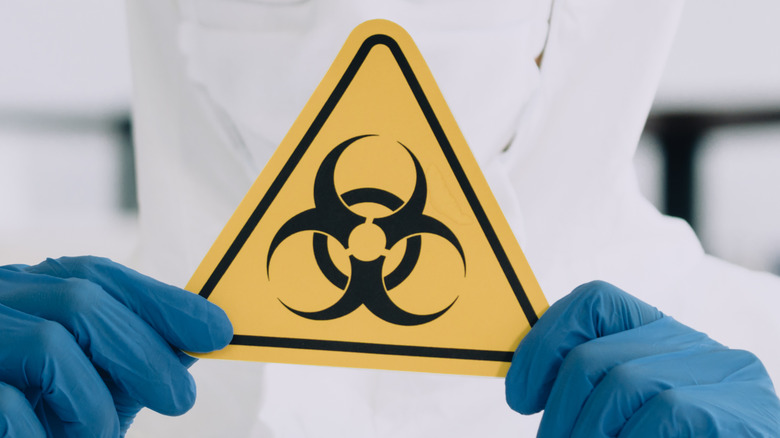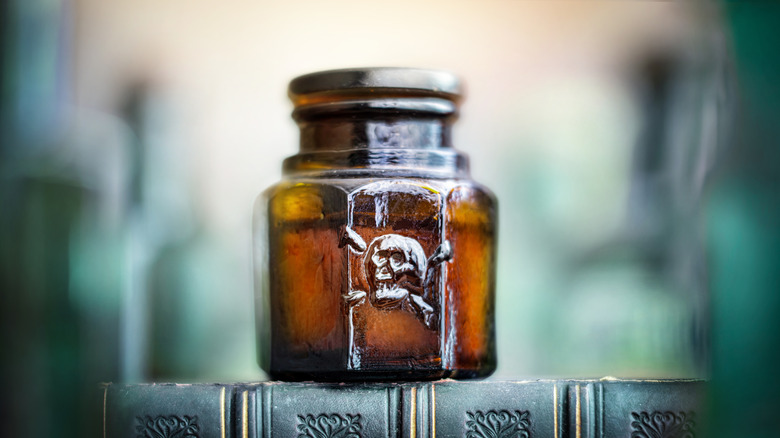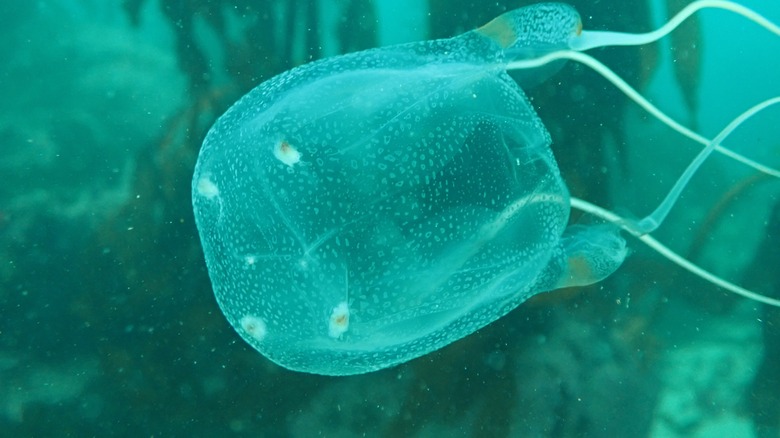The Difference Between Toxins, Poisons, And Venom
Poisons, venoms, and toxins, what in the world is the difference between these things? Sometimes the words will be used interchangeably with one another, but that isn't quite scientifically accurate, and the lack of distinction if you ever find yourself in a situation where you aren't for sure what's affecting your body can make for some dangerous scenarios.
Not all poisons are toxins. According to MedlinePlus, "Toxins are substances created by plants and animals that are poisonous (toxic) to humans." This means, for instance, bacteria can release toxins in the human body, poisoning the person being affected by the bacteria. Some toxins can also be found in metals such as lead, according to MedlinePlus. However, one important distinction to make is that synthetically engineered toxins are referred to as toxicants, and not toxins, according to Discard Studies. Toxicants are usually engineered for a specific purpose and produced on a large scale.
What are poisons?
What are poisons? According to National Capital Poison Center's Poison Control, "a poison is any substance that can cause harm to the body." Although the definition is very similar to toxins, poison is anything that hurts living things, whereas a toxin is a harmful substance that is created by living things.
To give an example to clear up the confusion, milkweed is a plant that produces the toxin cardiac glycosides. When humans consume that toxin they are poisoned. However, humans can also be poisoned by consuming bleach, accidentally taking the wrong dosage of pills, or inhaling toxic gas, all of which are synthetic compounds that can cause harm to live creatures. In other words, both toxicants and toxins would both be considered to be poisons, but toxins are specifically the result of organisms (via Poison Control). With all of this, what is the difference between something being venomous and something that is poisonous?
What is venom?
At this point, the difference between poisons and venoms gets even more subtle. Poisons are harmful substances that living creatures absorb or somehow take in. Venom is a toxin that enters the body from a bite by a venomous creature (via National Park Service). Examples of venomous creatures include the box jellyfish (above), one of the deadliest jellies on the planet. It's a 10-foot-long sea creature that produces some of the most deadly venom in the world. The venom attacks the heart, nervous system, and skin cells in a manner that sometimes causes people to go into shock and drown due to the pain, according to National Geographic.
It's important to note that venomous creatures can also utilize toxins that are poisonous when absorbed. For example, Asian tiger snakes, or Yamakagashi in Japan, are snakes that eat poisonous toads, and as a result, are able to absorb the toxins and release them when predators are attacking; they can also inject venom through small fangs that are located toward the back of the snake's mouth, according to National Park Service.
Why is it important?
What's the point in understanding the difference between poisons, toxins, and venoms? Knowing what's affecting your body can make it easier for doctors and for you to take action on any immediate dangers you're experiencing. For example, normal toxins that are created by venomous animals and poisonous creatures usually tear muscle tissue, harm specific cells, and can be aided with certain medicines and ailments, whereas toxicants can cause cancer, and must be regulated in different ways, according to Discard Studies.
In the United States, there are 55 independent poison centers that act together as Poison Control. If you find yourself poisoned in any such manner it is a good idea to call their hotline: 1-800-222-1222. Poison Control is advised by professionals such as doctors, nurses, and pharmacists, who can help you get the assistance you need in an emergency situation. Knowing what it is that's threatening you can get you what you need in a quicker fashion than otherwise (via Poison Control).



